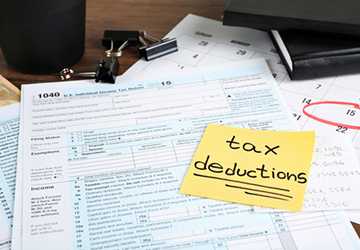Hey there, fellow real estate enthusiasts! If you're diving deep into properties and homes, you know that tax time can be a sweet deal or a headache. Lucky for you, the real estate game comes with some neat tax breaks. Let's dive into the top tax breaks every real estate professional should know about.

Alright, let's kick things off with a biggie: mortgage interest. Do you know that big chunk of change you're paying your lender each month? Uncle Sam gives you a break on that. In real estate professionalism, it is customary that if one has procured a loan for property acquisition, the interest disbursed on said mortgage is typically deemed eligible for deductibility. Sounds sweet, right?
Here's the lowdown: The government provides the opportunity to attenuate your taxable income by deducting the interest disbursed on your mortgage, thereby mitigating the overall tax liability. So, if you're shelling out $12,000 a year in interest, that's $12,000 less the IRS can touch. Remember, there are some limits and conditions, so always double-check with a tax pro.
No, we're not discussing daily wear and tear on your favourite sneakers. In real estate, depreciation is your ticket to serious tax savings. The IRS acknowledges that buildings and properties lose value over time (hey, everything gets a bit older and crankier, right?).
So, as a property owner, you get to claim this "loss of value" each year as a tax deduction; this is called depreciation. The best part? Even if your property appreciates in the market, you can still claim depreciation. It's like having your cake and eating it too!
Let's face it: property taxes can sometimes feel like a never-ending stream of bills. However, some auspicious tidings prevail: these expenditures are typically eligible for deduction on federal tax filings. As a real estate professional, you can frequently claim deductions on property taxes for rental properties and your residence.
Just like with mortgage interest, this deduction lowers your taxable income. It's a simple yet effective way to keep more money in your pocket when tax time rolls around.
Telecommuting has emerged as the prevailing paradigm, constituting the contemporary norm for many individuals. But did you know that as a real estate professional, you can turn that home office into a tax deduction? Yep, it's true!
You are entitled to deduct a fractional share of your dwelling-incurred expenses when you designate a specific area within your abode exclusively for undertaking your real estate business; this includes considerations such as utilities, insurance, and a fractional component of your rental or mortgage expenses. Ensure your home office is used regularly and exclusively for business, and you're good to go.
Last, let's discuss everyone's favourite part: travel and entertainment. As a real estate professional, you're likely always on the move, meeting clients, scouting properties, or attending industry events. And guess what? Many of those travel expenses can be deductible.
Keep track of receipts for everything from keeping track of those receipts from airfare and hotel stays to meals and entertainment. They can often be deducted come tax time if they relate to your real estate business. Just remember to keep detailed records and always follow the IRS guidelines.
Upon the disposition of a property leading to a profit, the realized gain assumes the classification of a capital gain. Providentially, if one has inhabited the property for at least two years within the antecedent five-year timeframe preceding the sale, there exists the opportunity to deduct up to $250,000 of the gain from one's taxable income (or $500,000 in the case of marital status and filing jointly).
Have you ever encountered the intricacies of a 1031 exchange? It functions as a paradigm reminiscent of the paramount real estate exchange venue! Facilitated by this tax incentive, you can divest an investment property and channel the proceeds toward acquiring a new property, all while deferring the immediate taxation of the sale.

It serves as an exemplary strategy for postponing the impact of capital gains taxes and, concomitantly, fostering the potential expansion of your real estate portfolio.
Owning real estate means there will always be repairs and maintenance to handle. The good news? Several of these costs are eligible for deduction from your taxable income. Whether fixing a leaky roof, painting a property, or doing regular maintenance, keep detailed records of all expenses.
While we all aim for profitable ventures, sometimes real estate investments can result in losses, especially in the early stages. The IRS allows you to deduct these losses against other sources of income, such as your salary or other investments.
This statutory provision can mitigate other taxable income, diminishing aggregate tax liability. Ensure you meet the IRS's criteria for real estate professional status, as there are specific rules regarding passive activity losses.
You can pay "points" to lower your interest rate when securing a mortgage. These points can often be deducted as mortgage interest on your tax return, potentially providing a significant tax break.
Ensure the points fit the IRS's requirements for deductible points and were utilized to purchase or upgrade your principal dwelling. In conformity with established conventions, seeking guidance from a seasoned tax advisor to acquire an exhaustive comprehension of the intricate subtleties ingrained in your unique financial milieu is judicious.
Navigating the world of taxes can seem daunting, but with these top 5 tax breaks for real estate professionals, you're well on your way to maximizing your savings. To determine the optimization of all allowable deductions and to strictly comply with the latest tax regulations, the advice of an experienced tax professional must be constantly sought.